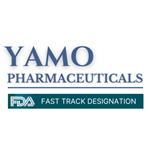
Yamo Pharma Presents Statistically Significant Phase 2 Autism Results for L1-79 at INSAR 2025
Trial achieves unprecedented and clinically meaningful socialization gains in adolescents and young adults, addressing core autism symptoms currently lacking FDA-approved therapies
/EIN News/ -- NEW YORK, May 08, 2025 (GLOBE NEWSWIRE) -- Yamo Pharmaceuticals, a clinical-stage biopharmaceutical company dedicated to treating the core symptoms of autism spectrum disorder (ASD), today announced positive Phase 2 results for L1-79, presented at the International Society for Autism Research (INSAR) 2025 Annual Meeting.
The 12-week randomized, double-blind, placebo-controlled crossover study (n = 58, ages 12-21) showed statistically significant and clinically meaningful improvements in the Vineland-3 Socialization Standard Score (VSSS) and several secondary outcome measures during the first period, while maintaining a favorable safety profile. The VSSS is widely recognized as the gold-standard instrument for objectively measuring real-world social skills, directly addressing a core symptom of ASD.
Key Phase 2 Highlights
- Robust social improvement: L1-79 produced a 7.94-point advantage over placebo on the VSSS (p =0.01), nearly double the 4-point minimal clinically important difference (MCID) recognized by experts.1
- Clinical global impression: Investigator-rated severity (CGI-S) improved by ~0.6 points versus placebo (p < 0.02), indicating a meaningful reduction in overall socialization symptom burden.
- Caregiver-reported change: On the Caregiver Global Impression of Change in the three most bothersome symptoms of ASD (CaGI-3P), families reported mean improvements of 0.48–0.61 points (p < 0.05).
- Favorable safety and tolerability: L1-79 was generally safe and well tolerated, with no serious adverse events and no trial dropouts with L1-79 due to side effects.
“These results are extremely encouraging for the autism community,” said J. Thomas Megerian, MD, PhD, Chief Medical Officer at Yamo Pharmaceuticals. “Seeing nearly an 8-point jump in Vineland Socialization scores is remarkable. To our knowledge, this is one of the largest positive effects observed to date on an adaptive-behavior measure in ASD for any medication. More importantly, it represents a clinically meaningful change—essentially moving patients to a higher level of social functioning. For families and clinicians, that could translate to noticeable gains in real-life social engagement and independence.”
Dr. Megerian added that both clinician- and caregiver-reported global assessments corroborated the Vineland findings. Trial investigators rated participants on L1-79 as having lower overall symptom severity (CGI-S), and caregivers reported clear improvements in their loved ones’ most bothersome symptoms (CaGI-3P). “These global impression scales matter because they capture day-to-day life,” he explained. “For example, a parent might cite difficulty engaging in back and forth conversation, seeking friendship, showing flexibility, or engaging in repetitive behaviors or speech as top concerns—and on L1-79 we saw improvement across all of them. That kind of broad positive shift defines meaningful benefit in autism treatment.”
L1-79’s compelling efficacy may stem from its unique mechanism. The drug inhibits tyrosine hydroxylase, the rate-limiting enzyme for dopamine and norepinephrine production. Overactive catecholamine signaling has been tied to ASD-related social and sensory difficulties; by tempering this activity, L1-79 aims to rebalance circuits governing social interaction and communication. “Rather than chasing downstream symptoms, we’re modulating a core neural pathway,” noted Dr. Megerian. L1-79 is the first autism therapy to directly target catecholamine synthesis—an approach now backed by emerging research.
“With these compelling Phase 2 data, we are moving full speed into Phase 3 planning and FDA discussions,” said Chuck Bramlage, Chief Executive Officer of Yamo Pharmaceuticals. “Our mission is clear: bring the first medicine that meaningfully improves social functioning in autism to patients as quickly and responsibly as possible.”
About L1-79
L1-79 is an oral, first-in-class tyrosine-hydroxylase inhibitor designed to modulate catecholamine signaling. Preclinical and human studies suggest dysregulated catecholamines contribute to core social difficulties in ASD. L1-79 selectively targets this pathway to improve social-communication function. The FDA granted L1-79 Fast Track designation in May 2018.
About the Phase 2 Study
The multicenter, randomized, double-blind, placebo-controlled, two-period crossover trial (NCT05067582) enrolled 58 participants (ages 12–21) who received L1-79 (200 mg or 300 mg BID) or placebo for 12 weeks, followed by a six-week washout and crossover. Due to a pre-specified statistically significant period-by-treatment interaction, primary and secondary efficacy analyses were confined to Period 1.
Full details are available at https://clinicaltrials.gov/study/NCT05067582
About Autism Spectrum Disorder
ASD is a neurodevelopmental condition characterized by two core symptom domains: (1) persistent difficulties in social communication and interaction and (2) restricted or repetitive behaviors and interests. Symptoms typically emerge in early childhood and persist throughout life, with wide variability in presentation and support needs. In the United States, the CDC estimates that approximately 1 in 31 children is diagnosed with ASD, with boys affected nearly four times more often than girls.2 No FDA-approved medications currently address the core symptoms of autism; existing treatments (e.g., risperidone, aripiprazole) target irritability and often carry significant side effects.
About Yamo Pharmaceuticals
Founded in 2015, Yamo Pharmaceuticals is a clinical-stage company committed to advancing L1-79 as a novel therapeutic option for the core symptoms of ASD. Supported by strategic partners such as the Autism Impact Fund, Yamo completed its Phase 2 study in 2024 and is preparing for pivotal Phase 3 trials.
Visit www.yamopharma.com for more information.
References
- Chatham et al. Adaptive behavior in autism: minimal clinically important differences on Vineland-II. Autism Res. 2018;11(2):270-283.
- Maenner et al. Prevalence and early identification of Autism Spectrum Disorder among children aged 8 years—Autism and Developmental Disabilities Monitoring Network, 2022. MMWR Surveill Summ. 2025;74(SS-2):1-22.
Media & Investor Contacts
- Chuck Bramlage, CEO – cbramlage@yamopharma.com
- Eugene Prahin, CAO – eprahin@yamopharma.com
- Phone: (212) 610-1570

Distribution channels: Healthcare & Pharmaceuticals Industry ...
Legal Disclaimer:
EIN Presswire provides this news content "as is" without warranty of any kind. We do not accept any responsibility or liability for the accuracy, content, images, videos, licenses, completeness, legality, or reliability of the information contained in this article. If you have any complaints or copyright issues related to this article, kindly contact the author above.
Submit your press release


